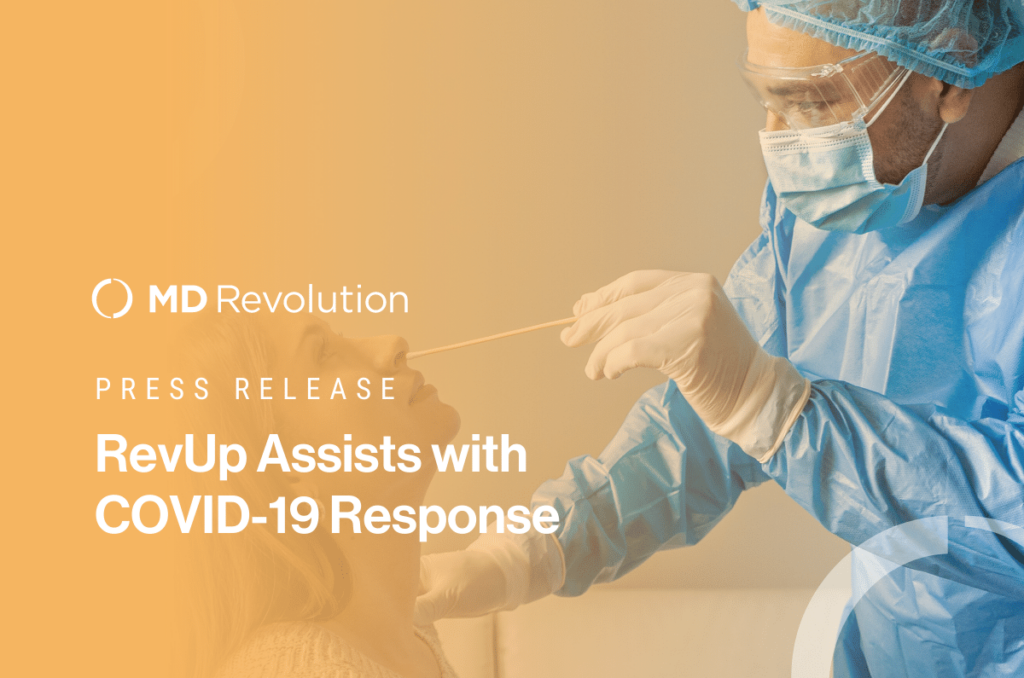During an outbreak of a new virus (such as COVID-19) or any new disease, there is often a lot of uncertainty, misinformation, and the potential for undue anxiety. Like you, our MD Revolution Clinical team continues to watch and listen to updates from the Centers for Disease Control (CDC) and the World Health Organization (WHO), so we can share and support your patients with up to date guidance and advice from the experts leading the fight against this emerging health issue.
MD REVOLUTION IS ASSISTING YOUR PRACTICE
We also acknowledge in times like this the important role our technology can play in the lives of those under our care, and especially the benefits of remote patient support. The MD Revolution team is already in place, working for your practice to be one of the first lines of education for your patients, and to help reduce the burden on your practice so you can focus on the patents who need your attention most.
Patients in care management have access access to our health coaches who can provide information and answer questions. Our established relationship with the patient means they have a connection with our care team and previously-planned calls in place.
What we are doing for your practice:
- We help your practice prioritize health care to those who need it most urgently, by deploying our offsite care team to communicate with your patients
- We educate our clinical care team on the latest information to answer patient questions and help provide support to those who may be stressed or confused by the rapidly changing information about the virus.
- We advise patients to follow practices protocols and CDC guidelines
- We escalate any urgent cases to your office, providing them with the information they need before they come in
OTHER GUIDELINES
The biggest keys right now remain prevention and containment. Like many, our hope is that we will overcome COVID-19 quickly and return to our normal activities. As we continue to monitor the situation across the US, we are taking this opportunity to address the issue with patients, calm fears, and encourage patients to be both prepared and supported during this Pandemic, as declared by the World Health Organization.
We recognize that many of our clients and individual clinics may not have immediate access to COVID-19 testing kits, nor have the space or appropriate triage systems in place for an immediate influx of patients. To that end, we are encouraging patients with mild symptoms to please stay home, isolate if symptomatic, and avoid contact with others, specifically the elderly or those with chronic diseases, and contact local health departments, if necessary, for testing instructions.
Additionally, we are encouraging patients to stay hydrated, self-medicate short term with OTC meds (as appropriate) for generalized body pain, or fever, and/or cough. If a patient develops chest pain, a high fever of greater than 102.5, or shortness of breath, we are encouraging them to contact local health officials, EMS, and/or go to the nearest ER for evaluation, as many Emergency Departments are now set up with proper protocols for checking for flu, strep, other viruses, and COVID-19, and have masks and isolation rooms/tents to protect vulnerable patients.
A few quick points to remember and pass along:
- AVOID HANDSHAKING. Limit your exposure and physical interactions with the general public including friends or acquaintances who you think have not been exposed. Avoid kissing, hugging, and sharing cups/utensils, etc. Utilize non-physical gestures when interacting in situations whenever possible.
- Beware of your use and touch of light switches, door handles, elevator buttons, etc. Lift gasoline dispensers with a paper towel, and wash your hands as often as possible or use 60%+ alcohol-based hand sanitizer after touching public surfaces. Especially important when touching bathroom door handles and other commercial doors.
- Keep a bottle of sanitizer available at your home and/or office entrances, AND in your car for use after getting gas or touching other contaminated objects when you can’t immediately wash your hands.
- Use disinfectant wipes at the stores, when they are available, and wipe the handle and child seat in grocery carts and shopping baskets. Avoid touching eyes, noses, and mouths.
- WASH YOUR HANDS, OFTEN, with soap for at least 20 seconds and/or use a greater than 60% alcohol-based hand sanitizer whenever you return home from ANY activity that involves locations where other people have been.
- If possible, cough or sneeze into a disposable tissue and discard. Use your elbow only if you have to. The clothing on your elbow will contain an infectious virus that can be passed on for up to a week or more!
- Avoid large public gatherings with very close person-to-person contact and when possible maintain at least 3 feet distance between yourself and anyone who is coughing or sneezing.
- If you feel sick with a fever, cough, or are having difficulty breathing, and have been in close contact with a person known to have COVID-19 or has been recently exposed, call your healthcare provider FIRST! Please, Do Not rush to the Emergency Department, unless you are acutely or emergently ill. If your symptoms are mild and you are feeling ill, keep yourself at home, and as separate from other people as possible. Your healthcare provider or PCP will work with your state’s public health department and the CDC to determine if you need to be tested. Going into a clinic, hospital, emergency room, or other location increases the chance of unintended exposure of others, further spreading the virus.
Here is additional information regarding COVID-19:
Coronavirus and The Elderly / High Risk Populations
Coping with stress during the 2019-nCoV outbreak
Please feel free to use this information and share with your patients for questions or concerns regarding the virus.



